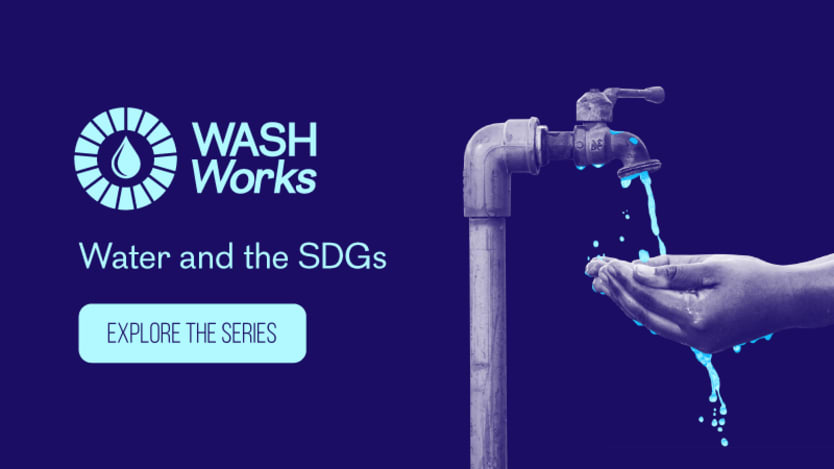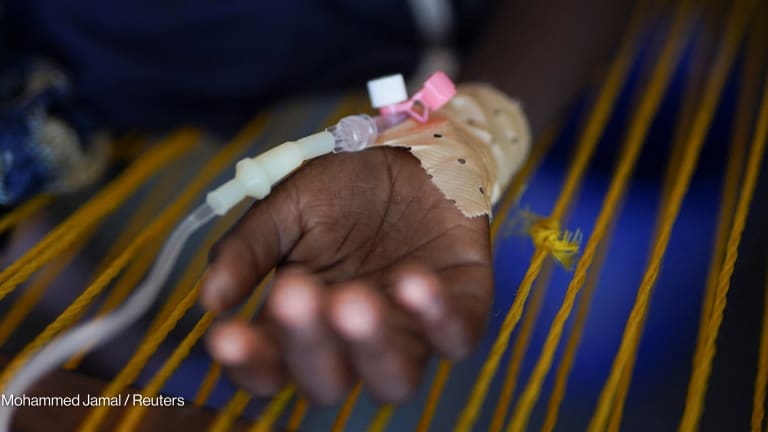
At the end of the G-7 Summit in June, U.K. Prime Minister Boris Johnson announced that the groups’ leaders had pledged to supply more than 1 billion coronavirus vaccines to low- and middle-income countries by the end of 2022.
G-7 leaders didn’t have a sudden bout of altruism. They recognized that COVID-19 has shown us that our economies are interdependent.
But it is shortsighted to think that ending this pandemic will fix our global economy. We need to take this moment also to fix the structural deficiencies that have far-reaching impacts on us all. Not least of all is access to water.
To truly revive the global economy, we need more than vaccines. We need water.
Water has been vital to the success of preventing the spread of and treating COVID-19. But while in Australia we sang happy birthday twice with our hands under the tap to slow the spread of COVID-19, billions of people around the world could not take this simple measure to protect themselves because they do not have access to water — let alone soap!
In Papua New Guinea, for example, only 28% of rural households have a handwashing facility with soap and water. Only 43% of the population have access to safe drinking water less than a 30-minute return trip from the household. Too many Papua New Guineans could not wash away germs, could not safely hydrate the ill, and could not sterilize medical equipment.
The answer is that policymakers simply don’t prioritize water. If they do, they don’t prioritize investing in strengthening the institutions and capacities needed to manage water and ensure access to water.
—Access to water underpins just about every aspect of a functioning society and needs to be front and center of any global COVID-19 recovery plan. For too long, governments around the world have failed to prioritize household access to WASH and the sustainable management of water resources — with potentially devastating consequences for us all.
The evidence is very clear that global clean water supplies are diminishing. Climate change has changed weather patterns. In some areas, droughts are drying up water catchments, in others, floods are creating an oversupply and contaminating water supplies, and in many places, storms are destroying vital water infrastructure.
This water crisis is a risk to our safety and security — as individuals, communities, nations, and as a species. The World Bank estimates that by 2025, about 1.8 billion people will be living in regions or countries with absolute water scarcity. When communities are perpetually water insecure, it can fuel conflicts over water resources, distort economies, and exacerbate grievances with governments and between neighbors.
The question then becomes, if we know there is a water crisis: Why aren’t we doing anything about it?
The answer is that policymakers simply don’t prioritize water. If they do, they don’t prioritize investing in strengthening the institutions and capacities needed to manage water and ensure access to water. For too long, water — and all aspects of our society relying on it — have not been prominent in decision-making.
To truly revive the global economy, we need more than vaccines. We need water.
—The water crisis is the result of decades of political neglect and mismanagement of water. It can only be fixed with political will, investment in governance, and ensuring that water resources are managed for multiple uses. Now is the time for that to change.
Australia is already at the helm of this push. As a member of the United Nations High Level Panel on Water, former Australian Prime Minister Malcolm Turnbull was instrumental in pushing for strengthened water governance to manage it better and encourage more international cooperation to achieve shared water security.
As a result, the U.N. World Water Development Report for 2021 focuses on changing the way we value water. It calls on governments to reassess how they value water and make water management central to their wider decision-making.
More from WASH WORKS:
► The neglected of the neglected: Tackling noma
► Opinion: How to ensure WASH services in all health care facilities
We know that properly funded, government-led interventions involving communities, scientists, civil society organizations, and the private sector can make a huge difference. Singapore, South Korea, Malaysia, and Thailand all achieved total coverage of hygiene and sanitation services within one generation.
Though each program differed in its design and implementation, its transformations were grounded in high-level political leadership and continued commitment to broader public health, housing, and hygiene programs.
As Australia’s Minister for Foreign Affairs Marise Payne said at the high-level meeting on water on March 18, “As the driest inhabited continent … we have learned to adapt and manage water scarcity in a harsh and unpredictable environment.”
Australia is in a unique position to use our decades of water management experience to help governments and multilateral organizations put water front and center of the development agenda. But we can only do this if we have broad support across government, the private sector, and civil society.
COVID-19 has changed how we think about the way we live, work and travel as a global community. It has also changed the way we think about water. We hope this serves as an important reminder not to forget those lessons as we move forward.
Michael Wilson and Rosie Wheen are hosts of the Good Will Hunters “Winter Series on Water for Development'' podcast — a series of conversations on Water for Development. Good Will Hunters is produced by Good Will Media and sponsored by the Australian Water Partnership.
Visit the WASH Works series for more coverage on water, sanitation, and hygiene — and importantly, how WASH efforts intersect with other development challenges. You can join the conversation using the hashtag #WASHWorks.










